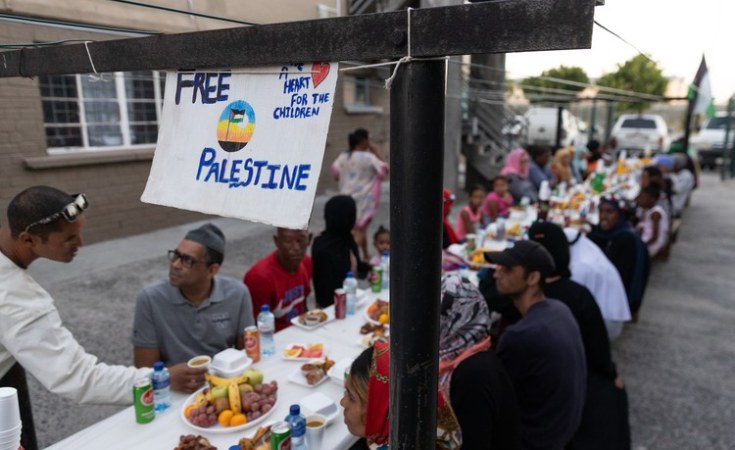In Palestine and across the African continent, national liberation from colonialism is incomplete without sovereignty over the land
On March 30, the world marked the 48th anniversary of Land Day in Palestine. The day serves as a reminder that the people of historic Palestine, though divided by the zionist occupation, remain a single people with a common struggle for freedom. Peace-loving people around the world have, since 1976, joined Palestinians throughout historic Palestine and the refugee camps in neighboring countries to defend the rights of the Palestinian people to the lands from which they had been alienated.
Writing in 1916 (only one year before the infamous Balfour Declaration) the first Secretary General of the African National Congress, Sol Plaatje described the effect of the racist Natives Land Act in South Africa as one where "Awaking on Friday morning, June 20, 1913, the South African native found himself not actually a slave, but a pariah in the land of his birth."
The Natives Land Act of 1913 was a cunning juristic instrument which paved the way for segregation, apartheid, and a special type of colonialism where the colonized majority had to live alongside their ruthless colonizers who enriched themselves through the oppression and exploitation of the black majority. In 1948 segregation was institutionalized as Apartheid in South Africa - the official policy of the then recently elected National Party. At the same time, a brutal, settler colonial campaign forcefully evicted 750,000 Palestinian people off their lands and made them pariahs in the land of their birth: namely historic Palestine.
The struggle for land
At the center of the colonial project, from Palestine to Africa, is the land question. In all cases, the wealth of the land (whether in the form of food, minerals or even water) is expropriated by the colonizers, often through the oppression and exploitation of the Indigenous people as laborers. In South Africa and Palestine, settler colonies were established through the brutal expropriation of land. Whereas the Zionist version is one of ethnic cleansing and extermination, as is evident from the live-streamed genocide underway in Gaza today, other settler colonies like South Africa, Zimbabwe and Kenya paired land expropriation with the economic exploitation of the Indigenous population.
The struggle for national liberation from colonialism, which the Palestinian people are today engaged in, must necessarily regain the land which the colonial project has unjustly expropriated. This struggle for land and freedom is legitimate and must be supported. It is, for example, no accident that the anti-colonial aspirations of the Kenyan people continue to be traced to Kenya's Land and Freedom Army - popularly known as the Mau-Mau. Similarly, the peasants of Tanzania have repeatedly reminded us that land is life. The ability to secure the social reproduction of our families and communities is at the heart of the struggle for freedom. This struggle for life-giving ownership and control over lands that were taken at the barrel of a gun during colonialism is an ongoing struggle in Africa. Whereas countries like Tanzania and Zimbabwe have made some headway, South Africa and Kenya have a much longer way to go in undoing the legacy of colonial land alienation. For this reason, the people's resistance in historic Palestine must be understood as firmly rooted in the long and ongoing tradition of the anti-colonial struggle to regain land, dignity and genuine independence.
Significantly, 78% of the Palestinian people lived off the land and most of their land (70%) took the form of community-owned agricultural land called Musha'as on the eve of the formalization of a zionist state (Israel) in 1948. By 2017, 85% of Palestinian land had been subject to expropriation by the forces of zionism. This blatant violation serves as the background for the ongoing Palestinian anti-colonial struggle. There is simply no justification for such blatant theft of an entire people's means of subsistence; just as there is every justification for fighting back against colonialism and occupation.
The Palestinian resistance has, once more, demonstrated to the world that the legitimate struggle for national liberation will not be thwarted by those who offer the world nothing but colonialism and fascism.
Peoples' movements and organizations struggling for Pan Africanism take inspiration from the bravery of the Palestinian people who have, since 1976 repeated a consolidated, clarion call for land and freedom. It was the same year (1976) when students took to the streets of South Africa to demand an end to the racist Bantu education policy of the apartheid government. The blood of these young revolutionaries nourished the final thrust in South Africa's struggle with the apartheid state; in many ways, it was the students of 1976 that propelled the country to its democratic breakthrough in 1994. These students breathed new life into the peoples' movements of South Africa, much like the martyrdom of the six activists on March 30, 1976, which consolidated and amplified the Palestinian struggle for real freedom.
1976 also marks the passing of Mao Zedong, the first leader of independent China who led a peasants' struggle for control over their lands and their country. Land Day is a good opportunity to recall his message in 1945 to the downtrodden peasants fighting for national liberation and against fascist, Japanese imperialism: "It is up to us to organize the people...Everything reactionary is the same; if you do not hit it, it will not fall".
The zionist genocide of the Palestinian people and the ongoing expropriation of Palestinian land is reactionary. We join the Palestinian people in hitting it, and it must fall.
Jonis Ghedi-Alasow serves as the executive director of Pan Africanism Today (PAT) and coordinates the work of the PAT Secretariat which works with 70 peoples' movements and organizations throughout the African continent who seek to build strength and unity.


